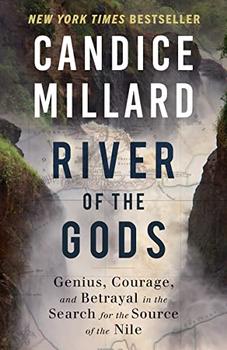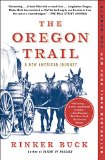Summary | Excerpt | Reviews | Beyond the book | Read-Alikes | Genres & Themes | Author Bio

Alone in a Fisherman's Skiff
by Rosemary MahoneyDown the Nile: Alone in a Fisherman's Skiff records Rosemary Mahoney's
solo journey rowing down the River Nile - a river that flows south to north,
which intrigues her*.
Mahoney's prose is lovely: "The more I learned about the Nile, the less
forbidding it seemed. I had so often imagined rowing on the Nile that doing so
had begun to feel less like a fantasy and more like a memory that only wanted
its corresponding action rightfully exercised." Her descriptions of the scenery,
topography and animals of Egypt paint vivid pictures in the reader's mind.
Rowing the Nile alone could be a daunting task for
any foreigner, but more so for a woman. While the
parts of the river she traverses (from
Aswan to Qena) are benign, civil unrest and
Egyptian attitudes to women make it challenging.
Although westerners tend to think of Egypt as one of
the most westernized Middle Eastern societies, attitudes toward women are heavily influenced by the
Muslim religion. Many women still wear the hijab,
which covers the head and neck, some women wear the
even more concealing niquab, revealing only their
eyes - so Mahoney was careful to dress
conservatively and took care never to touch a man in
public.
Ironically, Mahoney says that she "never visited any country in which sex had
so often arisen as a topic of conversation; had never witnessed more bald
nudity; …had never received so many offhand proposals of marriage and
professions of love from mustachioed strangers…had never been the target of more
wolf whistles and catcalls and distinctly salacious whispers emanating from
behind dusty clumps of shrubbery."
Throughout the book, men constantly tell Mahoney they are in love with her,
or just want to have sex with her. She learns that Egyptian men would never
say these things to Egyptian women, who are to be treated with respect, but
foreign women are fair game. While in Luxor, a man tells her that some of
the women coming into Luxor on the cruise ships flock
to the city looking for young boyfriends, and several European women keep apartments
in Luxor, that they visit three or four times a year, for the same purpose.
The attitude towards women made it difficult for Mahoney to accomplish her
task. The Egyptians are a curious people, and her fear was that if people got
wind of her plan to row the Nile alone, it would not be
permitted. She describes the Egyptian temperament as "invariably gregarious,
humorous, and welcoming" but also "spiked with a heavy dose of intrusiveness." Her
descriptions of some Egyptians make them sound like stereotypical overbearing
mothers-in-law.
Mahoney meets a boat owner who is willing to allow her to use his rowboat to
go part of the way down the river alone, under the condition that he follows
behind in another boat to ensure her safety. Amr, who treats Mahoney almost as an equal, is a most interesting person, and the book comes alive
with their meeting. He lives with his elderly mother and a sister, who has a severe limp,
in a small house in a remote village - with three televisions, one for each
family member!
As Mahoney relates her journey down the present-day Nile she compares her
Egyptian experience to the writings of Europeans who
traversed the river in the mid 19th century, a time period which marked the arrival of
European society in Egypt. She
quotes from Gustav Flaubert, author of Madame Bovary, and extensively
from the letters of Florence Nightingale (who both, but separately, spent the
winter of 1849-50 in Egypt, he at 28 and she at 29 years of age - winter
is the cool season in Egypt, summer being intolerably hot for European
travelers). These asides were intriguing, albeit sometimes a
little long, and added much to the book.
The author's journey to get in her own rowboat and finally to row alone on
the Nile is fascinating. The last hundred pages of the book are the strongest
because the reader becomes deeply invested in the outcome of the journey. Will
she make it, or won't she? It reads like a good mystery.
Down The Nile is a successful combination of a very personal journey
and a sociological study of a culture I thought I knew, but clearly did not.
*Rosemary Mahoney was intrigued by the Nile because it flows south to north. The idea that rivers flow north to south is apparently a belief that many hold to be true (perhaps because north is at the 'top' of the map and therefore rivers must flow 'down' to the bottom), but it is a fallacy. The one constant about rivers is that they flow downhill along the path of least resistance, in doing so they can and do flow north, south, east and west. The Nile is one of the most famous north flowing rivers - a fact which apparently caused some discombobulation among the ancient middle eastern people when they spread from Mesopotamia (the land between the Tigris and Euphrates Rivers, which flow more or less South-East into the Persian Gulf) to the Nile region. Equally, ancient Egyptian writings show that the Egyptians were disturbed to discover rivers that flowed in the 'wrong' direction. For example Tuthmosis I describes the Euphrates river as the "inverted water that goes downstream in going upstream."
![]() This review
first ran in the November 12, 2008
issue of BookBrowse Recommends.
This review
first ran in the November 12, 2008
issue of BookBrowse Recommends.

If you liked Down the Nile, try these:

by Candice Millard
Published 2023
The harrowing story of one of the great feats of exploration of all time and its complicated legacy - from the New York Times bestselling author of River of Doubt and Destiny of the Republic.

by Rinker Buck
Published 2016
An epic account of traveling the length of the Oregon Trail the old-fashioned way—in a covered wagon with a team of mules, an audacious journey that hasn't been attempted in a century.
Your guide toexceptional books
BookBrowse seeks out and recommends the best in contemporary fiction and nonfiction—books that not only engage and entertain but also deepen our understanding of ourselves and the world around us.